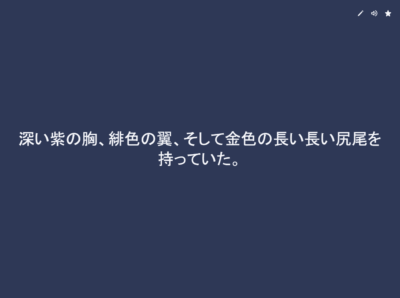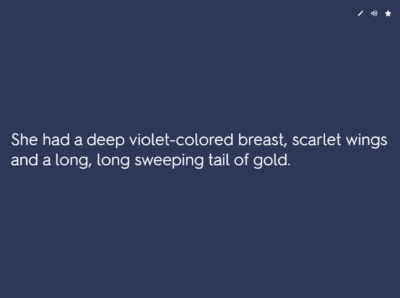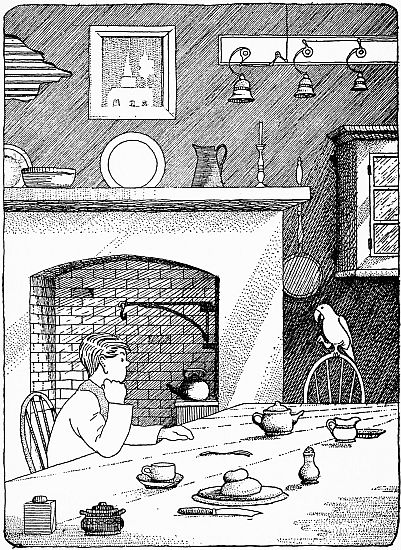『ドリトル先生航海記』 英文/和訳【8.あなたはよく気がつきますか?】
※カラフル対訳で紹介している作品はすべてパブリックドメインです。
このサイトで使われている作品のすべては著作権の切れた名作などの全文を電子化して、インターネット上で公開しているProject Gutenberg(プロジェクト・グーテンベルク)、LibriVox(リブリヴォックス、朗読図書館)の作品を出典としています。
翻訳者:satoyayo4080
JUST at that moment Polynesia came into the room and said something to the Doctor in bird language.
ちょうどその時、ポリネシアが部屋に来て先生に鳥の言葉で何か話した。
Of course I did not understand what it was. But the Doctor at once put down his knife and fork and left the room.
もちろん私にはそれがなんだかよくわからなかった。しかし、先生はすぐにナイフとフォークを置いて部屋を出ていった。
“You know it is an awful shame,” said the parrot as soon as the Doctor had closed the door. “Directly he comes back home, all the animals over the whole countryside[地方全体の] get to hear of it
「まったく気の毒なことですね」と先生がドアを閉めるとすぐにオウムは言った。「先生が家に帰ってくるとすぐに、ここら辺の動物たちは皆、話を聞きつけてやってくるんです。
and every sick cat and mangy rabbit for miles around comes to see him and ask his advice. Now there’s a big fat hare outside at the back door with a squawking baby.
そしてここいら何マイルの病気の猫や皮癬にかかって毛の抜けたウサギたちがみんな先生に会ってアドバイスをしてもらおうと来るんです。今、裏口の戸外にはガーガー鳴いている赤ん坊と一緒に太った野ウサギがいます。
Can she see the Doctor, please!—Thinks it’s going to have convulsions.[ひきつけ, 発作]
先生、この子を診てください!けいれんを起こしているようだと。
Stupid little thing’s been eating Deadly Nightshade[毒草の一種] again, I suppose. The animals are so inconsiderate at times—especially the mothers.
お馬鹿さんがまたベラドンナ でも食べたんでしょう。動物たちは時に他人に対する気遣いがありませんからねー特に母親たちはそうです。
でも食べたんでしょう。動物たちは時に他人に対する気遣いがありませんからねー特に母親たちはそうです。
They come round and call the Doctor away from his meals[食事から遠ざけ] and wake him out of his bed at all hours of the night. I don’t know how he stands it—really I don’t.
先生の食事中にやってきて食事を邪魔したり、四六時中真夜中だろうとお構いなしにたたき起こします。先生がどうやって耐えているのか、私には本当にわからない。
Why, the poor man never gets any peace at all! I’ve told him time and again to have special hours[特別な時間を持つ] for the animals to come.
かわいそうに、先生はまったくゆっくりすることができないんですからね!私は何度も何度も動物が来る時間を決めるように言ってきました。
But he is so frightfully kind and considerate.
でも、先生は恐ろしく親切で思いやりがあるものですから。
He never refuses to see them if there is anything really wrong with them. He says the urgent cases must be seen at once.”
動物たちに本当に悪いところがあったら、診察を断ったりは決してなさらないんです。緊急の場合にはすぐに診なければならないとおっしゃるのです」
“Why don’t some of the animals[Why don’t you~?で提案のフレーズ] go and see the other doctors?” I asked.
「他の先生のところにも行ったらどうなの?」と私は尋ねた。
“Oh Good Gracious!” exclaimed the parrot, tossing her head scornfully.
「おや、まぁ!」とオウムは叫んで、小ばかにしたように頭を振った。
“Why, there aren’t any other animal-doctors—not real doctors. Oh of course there are those vet persons, to be sure.
「どこに、動物のお医者さんが他にいるのでしょう。本当の医者ではなく。もちろん、獣医というのも確かにいるにはいます。
But, bless you, they’re no good. You see, they can’t understand the animals’ language; so how can you expect them to be any use?
でも、彼らではダメです。いいですか、彼らは動物の言葉も理解出来ない。どんな役に立つと思いますか?
Imagine yourself, or your father, going to see a doctor who could not understand a word you say—nor even tell you in your own language[自国語] what you must do to get well!
ちょっと考えてみて下さい。あなたやあなたの父親が言っている言葉が理解出来ず、また、元気になるためにどうしなければならないのか、人間の言葉で教えてもくれない医者に診てもらうでしょうか。
Poof![pooh]—those vets!
ふん、それが獣医さんだと言うのですからね。
They’re that stupid, you’ve no idea!—Put the Doctor’s bacon down by the fire, will you?—to keep hot till he comes back.”
彼らはそれほどバカなんです。あなたには見当もつかないかもしれません。先生のベーコンを火のそばに置いてもらえますか。先生が戻ってこられるまで冷めないように」
“Do you think I would ever be able to learn the language of the animals?” I asked, laying the plate upon the hearth.
「僕にも動物の言葉を学ぶことができると思う?」と私は皿を炉の上に置きながら尋ねた。
“Well, it all depends,” said Polynesia. “Are you clever at lessons?”
「そうですね、あなた次第ですね」とポリネシアは言った。「勉強はよくできるんですか?」
“I don’t know,” I answered, feeling rather ashamed. “You see, I’ve never been to school. My father is too poor to send me.”
「わからない」と私は少し恥ずかしく思いながら答えた。「ほら、僕は学校に行ったことがないんだ。お父さんがとても貧乏だから行かせてもらえないんだ」
“Well,” said the parrot, “I don’t suppose you have really missed much—to judge from what I have seen of school-boys.
「なるほど」とオウムは言った。「私は(人間の)学生たちを見たことがあるので判断しますが、あなたはそんなに頭の悪いようには思えません。
But listen: are you a good noticer?—Do you notice things well?
でも、お聞きなさい。あなたはよく気づく人ですか? 物事をよく注意して見ていますか?
I mean, for instance, supposing[もし…ならば] you saw two cock-starlings on an apple-tree, and you only took one good look at them—
要するに[つまり]、例えば、リンゴの木に2羽のムクドリがいるのを見たとして、1度よく見ただけで、
would you be able to tell one from the other if you saw them again the next day?”
次の日にもう一度見たときに、どっちがどっちだと見分けがつきますか?」
“I don’t know,” I said. “I’ve never tried.”
「わからない」と私は言った。「そんなこと試したことはないよ」
“Well that,” said Polynesia, brushing some crumbs off the corner of the table with her left foot—
「まあそれはいいとして」とポリネシアは左足でテーブルの角についたパンくずを払いのけながら言った。
“that is what you call powers of observation—noticing the small things about birds and animals:
「それが観察力というものです。鳥や動物について小さなことに気づくことです。
the way they walk and move their heads and flip[さっと動かす] their wings; the way they sniff the air and twitch their whiskers and wiggle their tails.
歩き方、頭の動かし方、翼の動かし方、風[空気]の匂いを嗅いだり、ヒゲを動かしたりや尻尾を振ったりする方法です。
You have to notice all those little things if you want to learn animal language.
動物たちの言葉を覚えようとするなら、そういう小さなことにも気づかなければいけません。
For you see, lots of the animals hardly talk at all with their tongues; they use their breath or their tails or their feet instead.
なにしろ、動物の多くは、ほとんど舌を使って話したりはしないものです。その代わりに息や尻尾、足を使います。
That is because many of them, in the olden days when lions and tigers were more plentiful, were afraid to make a noise[声を出すことを恐れていた] for fear the savage creatures heard them.
それは昔、ライオンやトラが今より沢山いた頃、多くの動物たちは野蛮な生き物に聞かれるのを恐れて声をださないようにしていたからなんです。
Birds, of course, didn’t care; for they always had wings to fly away with.
鳥は、当然ですが、そんなことを気にしません。彼らにはいつでも飛び立つことができる翼があったからです。
But that is the first thing to remember: being a good noticer[気に留める人] is terribly important in learning animal language.”
しかし、これが(動物の言葉を覚えるにあたって)最初に覚えておくべきことです。動物の言語を学ぶ上で優れた注意深い人であることはとても重要なのです」
“It sounds pretty hard,” I said.
「とても難しそうだね」と私は言った。
“You’ll have to be very patient,” said Polynesia. “It takes a long time to say even a few words properly.
「我慢強くないといけません」とポリネシアは言った。「ほんの片言だけでもきちんと言えるようになるまでには時間がかかります。
But if you come here often I’ll give you a few lessons myself.
でも、もしあなたが頻繁にここに来るようであれば、私も少しは教えてあげます。
And once you get started you’ll be surprised how fast you get on.[どれだけ進むのが早いのか] It would indeed be a good thing if you could learn.
そして一度(コツを覚え)始めればその上達の速さに驚くことでしょう。学ぶことができるのなら、そうするのが本当に良いことだと思いますよ。
Because then you could do some of the work for the Doctor—I mean the easier work, like bandaging and giving pills.
なぜなら、そうなったら先生の仕事の一部、つまり包帯を巻いたり、薬を与えたりなどのような簡単な仕事ができるからです。
Yes, yes, that’s a good idea of mine.
そう、これは良いアイデアですね。
’Twould[it would (廃れた用法)] be a great thing if the poor man could get some help—and some rest. It is a scandal the way he works.
先生[かわいそうな人]が誰かの助けを得て、少し休むことが出来れば素晴らしいことですね。先生の仕事ぶりは言語道断ですから。
I see no reason why you shouldn’t be able to help him a great deal[かなり多く]—That is, if you are really interested in animals.”
あなたがあまり先生を助けられないという理由はないと思います。それは、もし、あなたが本当に動物に興味があるならですがね」
“Oh, I’d love that!” I cried. “Do you think the Doctor would let me?”
「もちろん大好き!」と私は叫んだ。「先生が許してくれるだろうか?」
“Certainly,” said Polynesia—“as soon as you have learned something about doctoring.
「もちろんです」ポリネシアは言った。「あなたが医者[医者をすること]について少し学べばすぐだと思います。
I’ll speak of it to him myself—Sh! I hear him coming. Quick—bring his bacon back on to the table.”
私から話してあげましょう。シーッ!先生が来るのが聞こます。早く、先生のベーコンをテーブルに戻して」
対訳を使った瞬間英作文の練習
和訳を使った瞬間英作文の練習には①スマホでスクロールを上手に活用して和訳と英文を交互に見るか、②パソコンの場合なら下記のクイズレットの単語カードを利用する、のが便利です。模範解答である英文を見ることでよりネィティブに近い表現力を身につけることができます。



